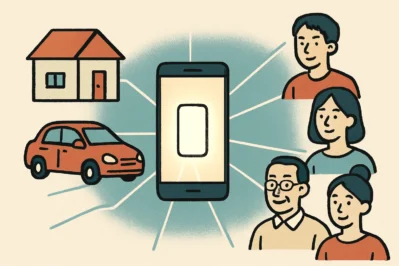Mastering Business Korean: The Sharing Economy Explained
Hello! Welcome to Maeil Hangul, here to upgrade your Korean skills to a professional level!
Today, we’re diving into a topic you’ll frequently encounter in Korean news, business meetings, and even everyday tech conversations: the Sharing Economy (공유 경제). Ever used an app to rent a car for a few hours or sell something to a neighbor? Then you’re already part of it! In Korea, a global leader in IT and platform innovation, this business model is not just a trend—it’s a core component of the modern economy. Understanding the specific terminology will allow you to participate in sophisticated discussions and grasp the nuances of contemporary Korean society.
Let’s get started!
Core Expressions You Need to Know
Here are the essential terms for defining and discussing the sharing economy like a pro.
1. 공유 경제 (Gong-yu Gyeong-je)
* Pronunciation [Romanization]: Gong-yu Gyeong-je
* English Meaning: Sharing Economy
* Detailed Explanation: This is the umbrella term for the entire concept. It’s derived from Hanja: 공유 (共有), meaning “to share” or “to jointly possess,” and 경제 (經濟), meaning “economy.” It refers to an economic system where assets or services are shared between private individuals, either for free or for a fee, typically by means of the internet. This is a formal term you would use in presentations, reports, or when discussing economic trends.
2. 플랫폼 비즈니스 (Peul-laet-pom Bi-jeu-ni-seu)
* Pronunciation [Romanization]: Peul-laet-pom Bi-jeu-ni-seu
* English Meaning: Platform Business
* Detailed Explanation: A direct loanword from English, this term describes the how of the sharing economy. A platform business doesn’t own the primary assets but creates value by acting as an intermediary that connects different user groups. Think of Kakao T (connecting drivers and passengers) or Airbnb (connecting hosts and guests). In business contexts, you’ll often discuss a company’s “플랫폼 전략” (platform strategy).
3. 유휴 자산 (Yu-hyu Ja-san)
* Pronunciation [Romanization]: Yu-hyu Ja-san
* English Meaning: Idle/Underutilized Assets
* Detailed Explanation: This is a key concept that fuels the sharing economy. 유휴 (遊休) means “idle” or “not in use,” and 자산 (資産) means “assets” or “property.” The sharing economy thrives on monetizing these idle assets—a car that sits in a garage most of the day (like for Socar, 쏘카), a spare room in a house, or even a person’s spare time and skills. Using this term demonstrates a deep understanding of the business model’s core principle.
4. 공급자와 수요자 (Gong-geup-ja-wa Su-yo-ja)
* Pronunciation [Romanization]: Gong-geup-ja-wa Su-yo-ja
* English Meaning: Supplier and Consumer (or Demander)
* Detailed Explanation: These are fundamental economic terms essential for analyzing any platform business. The 공급자 (供給者) is the one providing the service or asset (e.g., the driver, the host). The 수요자 (需要者) is the one demanding or consuming it (e.g., the passenger, the guest). Platforms are successful when they efficiently match these two parties, often referred to as “공급자와 수요자를 매칭하다” (to match suppliers and consumers).
Example Dialogue
Here’s how these terms might appear in a conversation between two colleagues, Jina and Mark, discussing a news article.
A (Jina): 마크 씨, 최근 한국의 공유 경제 시장 성장률에 대한 기사 읽어보셨어요? 특히 로컬 기반 플랫폼들이 눈에 띄게 성장하고 있더라고요.
(Mark, have you read the article about the recent growth rate of Korea’s sharing economy market? The local-based platforms are showing remarkable growth.)
B (Mark): 네, 봤어요. 전형적인 플랫폼 비즈니스 모델들이죠. 개인의 유휴 자산, 예를 들면 잘 쓰지 않는 캠핑 장비나 전문가용 카메라 같은 것들을 대여해주는 서비스가 인기라고 하더군요.
(Yes, I saw it. They are classic platform business models. I heard services that allow people to rent out their idle assets, like camping gear or professional cameras they don’t often use, are very popular.)
A (Jina): 맞아요. 핵심은 공급자와 수요자 간의 신뢰를 어떻게 구축하느냐에 달린 것 같아요. 리뷰 시스템이 그래서 중요하고요.
(That’s right. The key seems to be how they build trust between the supplier and the consumer. That’s why the review system is so important.)
B (Mark): 동의합니다. 그 신뢰가 플랫폼의 가장 큰 자산이 되는 셈이죠.
(I agree. That trust essentially becomes the platform’s greatest asset.)
Culture Tip & Trend Deep Dive
In Korea, the 공유 경제 isn’t just an abstract concept; it’s a tangible part of daily life, dominated by homegrown giants. While you might know Uber, Korea has Kakao T (카카오T). Instead of just eBay, Korea has Karrot (당근), a hyperlocal secondhand marketplace that has become a cultural phenomenon.
When you discuss this topic, you can sound like a true insider by mentioning the ongoing social debates. Korean news often covers the conflict between innovative 플랫폼 비즈니스 models and traditional industries (e.g., taxis vs. ride-sharing). Key phrases in these debates include “기존 산업과의 상생” (coexistence with traditional industries) and discussions about labor rights for “긱 워커” (gig workers), who are the primary 공급자 on many of these platforms. Mentioning these aspects shows you understand not just the definition, but the real-world implications in Korea.
Wrap-up & Practice!
Today we learned the essential vocabulary to define and analyze the sharing economy in a Korean business context: 공유 경제, 플랫폼 비즈니스, 유휴 자산, and 공급자와 수요자. These terms will empower you to understand business news, participate in high-level discussions, and truly grasp the dynamics of Korea’s innovative market.
Now, let’s put it to the test!
- Fill in the blanks:
에어비앤비는 집주인(______)의 비어있는 공간, 즉 ______을 여행객(______)과 연결해주는 대표적인 ______ ______이다. -
Short Answer Challenge:
Using the terms you learned today, briefly describe a sharing economy service from your country in Korean.
Leave your answers in the comments below! We’d love to see how you use these powerful new expressions. Keep up the great work






